- Bernard Preston homepage
- Weight Loss
- Feeling of Fullness After Eating
Feeling of fullness after eating
The feeling of fullness after eating may be described as satiety.
That feeling of fullness after eating is provided by a wide variety of foods that stimulate the L-cells in the small intestine to produce the incretin hormones. They send messages to the brain invoking that sense of "satiety;" having just enjoyed an elegant sufficiency.
Weight loss, anxiety about obesity and loss of enjoyment of our meals have become a daily preoccupation for so many people eating typical grocery store food; it need not be so. 52% of Americans have been dieting in the last year; a steep "uptick" from around 40 percent[1].
Just why are we so unsure what nutritional information to believe? And increasingly appear unconcerned whether our diets are actually contributing to our health. Has it become weight loss no matter what the cost to wellness is?
Toss out all the diets
"There is little support for the notion that diets lead to lasting weight-loss or health benefits.
We concluded most would have been better off not going on them at all."
- Prof Traci Mann, U of Minn, Health and Eating lab[1]
Research is unequivocal; diets simply don't work, mostly because they are not sustainable. Can you give up bread for ever? And is it actually necessary? What about potatoes, pasta and butter? Is gluten all bad?
These are all important questions. Make only changes that you can sustain for ever; or don't start in the first place.
It is far worse for your health to lose weight and then regain it; it would have been better by far had you never made a start at all.
Toss out all the diets; instead start to think about what is actually happening in your gut. Grasp the basic principles and you can discard that nasty "four-letter" word from your mind for ever.
Only make dietary changes to that are you are prepared to continue with for the rest of your life; anything less is blowing in the wind and doomed to fail.
The incretin hormones
There is a family of hormones called the "incretins" that are secreted by a very high density of cells in the small intestine. GLP-1 is one of them that is rather better known; drug companies are selling it for weight loss and management of blood glucose. Its release can be naturally stimulated by high-fibre grains, nuts and avocados; and eggs too[4].
The incretin hormones send stimuli to the pancreas to produce more insulin in response to carbs. And appetite-controlling peptides to the brain that signal when we have had enough to eat and should leave the dining room table promptly; preferably before dessert is served.
Does blending make a difference?
Another of them is PYY. Scientists have just shown conclusively that
high fibre diets stimulate the release of this incretin hormone,
messaging the pancreas and the brain[2]. Moreover it made no difference whether the food was blended or not.
But low fibre diets did not stimulate the L-cells to produce PYY. Consequently our pancreases do not get messages to release more insulin, blood glucose rises and the hypothalamus in the brain is not signaled that it's time to stop eating.
As a general rule fibre, protein and the healthy fats stimulate the production of the incretin hormones that help control appetite[3]. So whole grains, eggs and olive oil would rank highly; avocados too.
Microbiome
It was initially thought that the friendly bacteria, viruses and yeast cells inhabited only the colon. But it's now clearly been shown that they are found in the eyes, the mouth and the small intestine; and the bladder and the skin too, for example.
In this study it was clearly shown that large colonies of bacteria inhabit the small intestine; and that their numbers decreased markedly after food has passed through. The metabolites they release after feeding on fibre in the diet have a profound influence on wellness.
Generally it's recommended you take probiotics on an empty stomach. However this suggests that a small helping of sauerkraut, kimchi or kefir after the meal might also be beneficial; and certainly would do no harm. There are so many questions about nutrition that yet are to be answered.
Breakfast
Clearly we should start breakfast with some less-sweet fruit before any cereal; get that fibre into the gut first so that the pancreas gets early messages to start producing insulin. Then blood glucose will not start to rocket.
Another option would be this smoothie made with kefir, freshly-ground nuts and seeds.
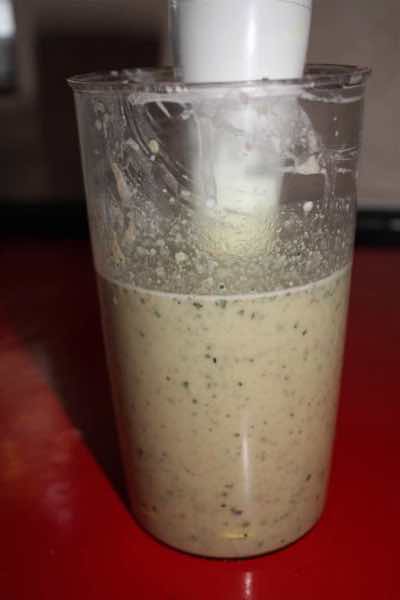 Kefir breakfast smoothie is rich in probiotics and fibre.
Kefir breakfast smoothie is rich in probiotics and fibre.An unrefined cereal such as this grits would also provide the fibre needed to stimulate the incretin hormones.
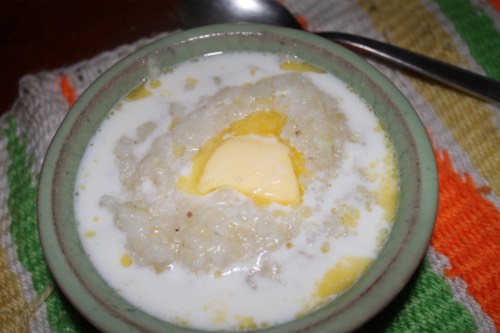
Salads
It's no coincidence that we usually would start lunch with a salad. Getting all that fibre into the gut before moving on to carbs would message the brain sooner when we have enjoyed elegant sufficiency; and have no need to finish the meal with a sugary dessert.
It is no coincidence that only 5% of those eating typical grocery store meals are getting the recommended daily allowance of at least 35 grams of fibre each day. Consequently they are constantly hungry and feeling the need to snack.
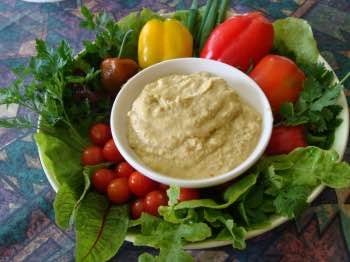
One slice is enough
I find it so interesting that after a salad with hummus and avocado that my brain starts sending out vivid signals; one slice of bread is enough.
That's especially true of our homemade loaf using only 100% wholegrain flour; it is fibre-rich.
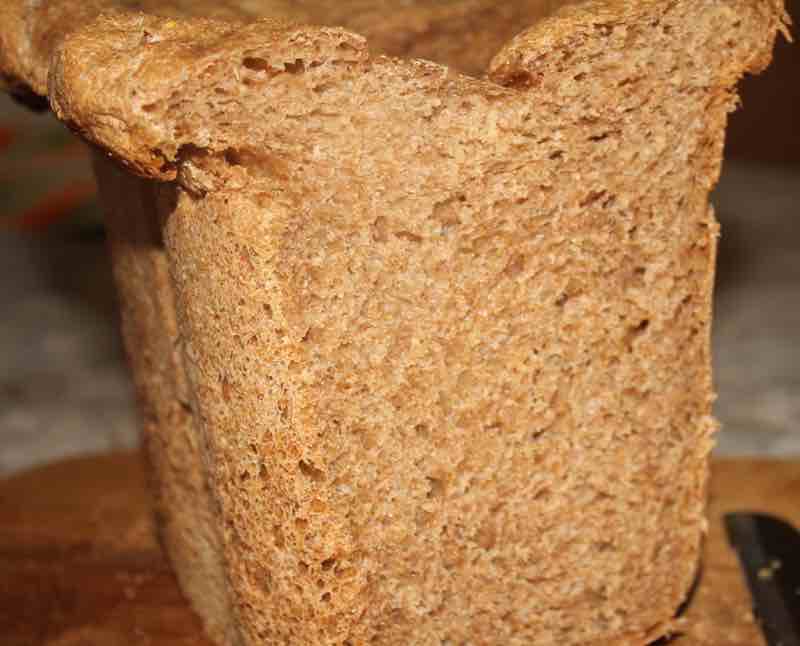 Bread made from 100% real flour is surprisingly light
Bread made from 100% real flour is surprisingly lightDinner
Supper would often begin with a fibre-rich soup such as this vichyssoise; an Irish potato and leek hors d'oeuvre.
A glass of mulberry honey mead also acts as a rich probiotic.
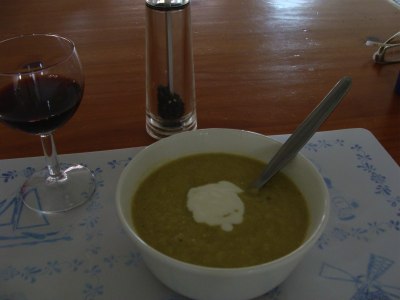
The research is unequivocal; get your probiotics from your food. In tablet form they do not give the broad spectrum of bacteria that our guts demand. In fact just the opposite happens; the intestines are flooded with only a few species.
Scientifically-proven weight loss program
Bernie's scientifically-proven weight loss program is based on this need for a feeling of fullness after eating our food. The caloric restriction diets fail miserably because they leave us constantly famished.
This is not a diet; just a new way of choosing wholesome foods that will enable us to slowly but surely shed those unwanted pounds.
The incretin hormones are increasingly being used for weight loss; it remains controversial to choose medication with many side effects over lifestyle changes but they do seem to be affective.
One serious side effect being reported is the danger of aspiration of food retained in the stomach into the lungs during surgery and deep sedation; despite having fasted as directed. These drugs delay gastric emptying.
Deep sedation is frequently used for colonoscopies.
Feeling of fullness after eating
The feeling of fullness after eating is often described as satiety. Sufficient dietary fibre profoundly affects the metabolite environment in the small intestine, playing an important role in PYY release.
Then messaging to the brain gives us that feeling of fullness after eating.
When browsing use right click and "Open Link in New Tab" or you may get a bad gateway signal.
Newsletter
Our newsletter is entitled "create a cyan zone" at your home, preserving both yourself and Mother Earth for future generations; and the family too, of course. We promise not to spam you with daily emails promoting various products. You may get an occasional nudge to buy one of my books.
Here are the back issues.
- Lifestyle and ideal body weight
- What are ultra-processed foods?
- Investing in long-term health
- Diseases from plastic exposure
- Intensive lifestyle management for obesity has limited value
- A world largely devoid of Parkinson's Disease
- The impact of friendly bacteria in the tum on the prevention of cancer
- There's a hole in the bucket
- Everyone is talking about weight loss drugs
- Pull the sweet tooth
- If you suffer from heartburn plant a susu
- Refined maize meal and stunting
- Should agriculture and industry get priority for water and electricity?
- Nature is calling
- Mill your own flour
- Bake your own sourdough bread
- Microplastics from our water
- Alternative types of water storage
- Wear your clothes out
- Comfort foods
- Create a bee-friendly environment
- Go to bed slightly hungry
- Keep bees
- Blue zone folk are religious
- Reduce plastic waste
- Family is important
- What can go in compost?
- Grow broad beans for longevity
- Harvest and store sunshine
- Blue zone exercise
- Harvest and store your rainwater
- Create a cyan zone at your home
Did you find this page interesting? How about forwarding it to a friendly book or food junkie? Better still, a social media tick would help.
- Bernard Preston homepage
- Weight Loss
- Feeling of Fullness After Eating
Address:
56 Groenekloof Rd,
Hilton, KZN
South Africa
Website:
https://www.bernard-preston.com